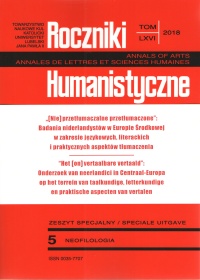Specialist terms of foreign origin in the practice of a Dutch family doctor
Abstract
This article includes examples of specialist terms coming from foreign languages which are used in the practice of the Dutch family doctor. The family doctor examines patients who come to him with a complaint. This article comprises names of various diseases, anatomic terms, diagnostic tests, treatment methods and medicines. Classical languages, like Latin and Greek, have had a big influence on the modern medical vocabulary and they are still in use. Not only have the whole words been borrowed but also their parts, prefixes and suffixes. Apart from the Latin and Greek terms there are also borrowings from English and French in the collected examples. The vocabulary contains different types of the word-formation, like simple words, compounds, derivates and terms, which consist of more words. In the group of compounds there are the so-called hybrid forms, in which each part comes from a different language. Besides, this vocabulary is rich in eponyms and acronyms.
References
Bügel, Peter C., Frank Baarveld & Jan Schuling. 2005. Bij de dokter. De achterkant van het genezen: voor huisartsen en hun patiënten. Maarssen: Elsevier gezondheidszorg.
Eekhof, Just, Arie Knuistingh Neven & Wim Opstelten. 2010. Kleine kwalen in de huisartspraktijk. Amsterdam: Elsevier gezondheidszorg.
Jochems, A.A.F. 2010. Medische termen in woord en geschrift. Houten: Bohn Stafleu van Loghum.
Ruff, Peter Wolfgang. 2001. Einführung in den Gebrauch der medizinischen Fachsprache. Reinbeck: LAU, Nourney: Europa-Lehrmittel.
Wilmanns, Juliane C., & Günther Schmitt. 2002. Die Medizin und ihre Sprache. Landsberg/Lech: Ecomed.
Copyright (c) 2018 Roczniki Humanistyczne

This work is licensed under a Creative Commons Attribution-NonCommercial-NoDerivatives 4.0 International License.





